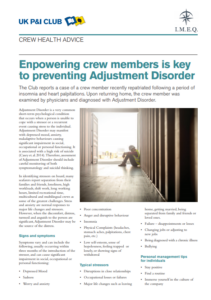The UK Club reported a case of a crew member who was recently repatriated after a period of insomnia and heart palpitations. The crew member was examined by physicians and diagnosed with Adjustment Disorder.
Adjustment Disorder is a psychological condition that happens when a person cannot deal with a stressor or a recurrent event causing stress. It may manifest with depressed mood, anxiety, maladaptive behaviours causing significant impairment in social, occupational or personal functioning. It is also related with a high risk of suicide. For this reason, assessment of Adjustment Disorder should include careful monitoring of both symptomatology and suicidal thinking.
[smlsubform prepend=”GET THE SAFETY4SEA IN YOUR INBOX!” showname=false emailtxt=”” emailholder=”Enter your email address” showsubmit=true submittxt=”Submit” jsthanks=false thankyou=”Thank you for subscribing to our mailing list”]
According to the the UK Club, in identifying stressors on board, many seafarers report separation from their families and friends, loneliness, high workloads, shift work, long working hours, limited recreational time, multicultural and multilingual crews as some of the greatest challenges.
Stress and anxiety are normal responses to major life changes, but when the discomfort, distress, turmoil and anguish to the person are significant, Adjustment Disorder may be the source of the distress.
Symptoms
Symptoms can vary and include among others the following, usually taking place within three months of the introduction of the stressor, and can cause significant impairment in social, occupational or personal functioning:
- Depressed Mood;
- Sadness;
- Worry and anxiety ;
- Poor concentration;
- Anger and disruptive behaviour;
- Insomnia;
- Physical Complaints (headaches, stomach aches, palpitations, chest pain, etc.);
- Low self-esteem, sense of hopelessness, feeling trapped or lonely, or showing signs of withdrawal.
Common stressors
- Disruptions in close relationships;
- Occupational losses or failures;
- Major life changes such as leaving home, getting married, being separated from family and friends or loved ones;
- Failure – disappointments or losses;
- Changing jobs or adjusting to new jobs;
- Being diagnosed with a chronic illness;
- Bullying.
Coping with Adjustment Disorder
- Stay positive;
- Find a routine;
- Immerse yourself in the culture of the company;
- Take notes – observe what is going on around you. Identify problem areas for you, and seek solutions to possible problems;
- Set personal goals aligned with the vision of the organisation;
- Be open and engage with others onboard by sharing information, ideas and thoughts, and, when appropriate, your emotions and thoughts;
- Share and cooperate;
- Be trustworthy. When people trust you, do your best to provide positive outcomes;
- Be accepting;
- Be supportive of others;
- Understand both your personal strengths and weaknesses;
- Seek assistance when needed;
- Be courteous and respectful to your colleagues;
- Increase personal and interpersonal insight;
- Apply active listening skills, empathy and validation when communicating with others;
- Communicate appropriately and responsibly, resolve conflicts when they arise in socially proactive ways.
Adjustment Disorder is an excessive reaction to an identifiable life stressor or recurrent stressors. A substantial amount of research suggests that psychosocial risk factors such as high job demands, low job control, high effort – low reward and low social support may contribute to the development of depression and anxiety. Organisations can implement interventions that aim to prevent exposure to psychological and physical risk factors and thus reduce the risk for mental disorders. Adjustment Disorder can be prevented via proactive methods and strategies
The UK Club explains.
To address this problem, it is important to encourage culture and team cohesiveness on board, empower employees and promote well-being at sea. Employees should be educated in acquiring appropriate communication skills, building supportive social networks onboard, and encouraging behavioural well-being can lessen distress arising from stressors.
Companies can empower employees by encouraging active coping skills, communication skills, building supportive social networks on board and implement resiliency training. In fact, work health can enhance employee well-being, performance and safety on board.
Explore more on Adjustment Disorder in the following PDF
































































